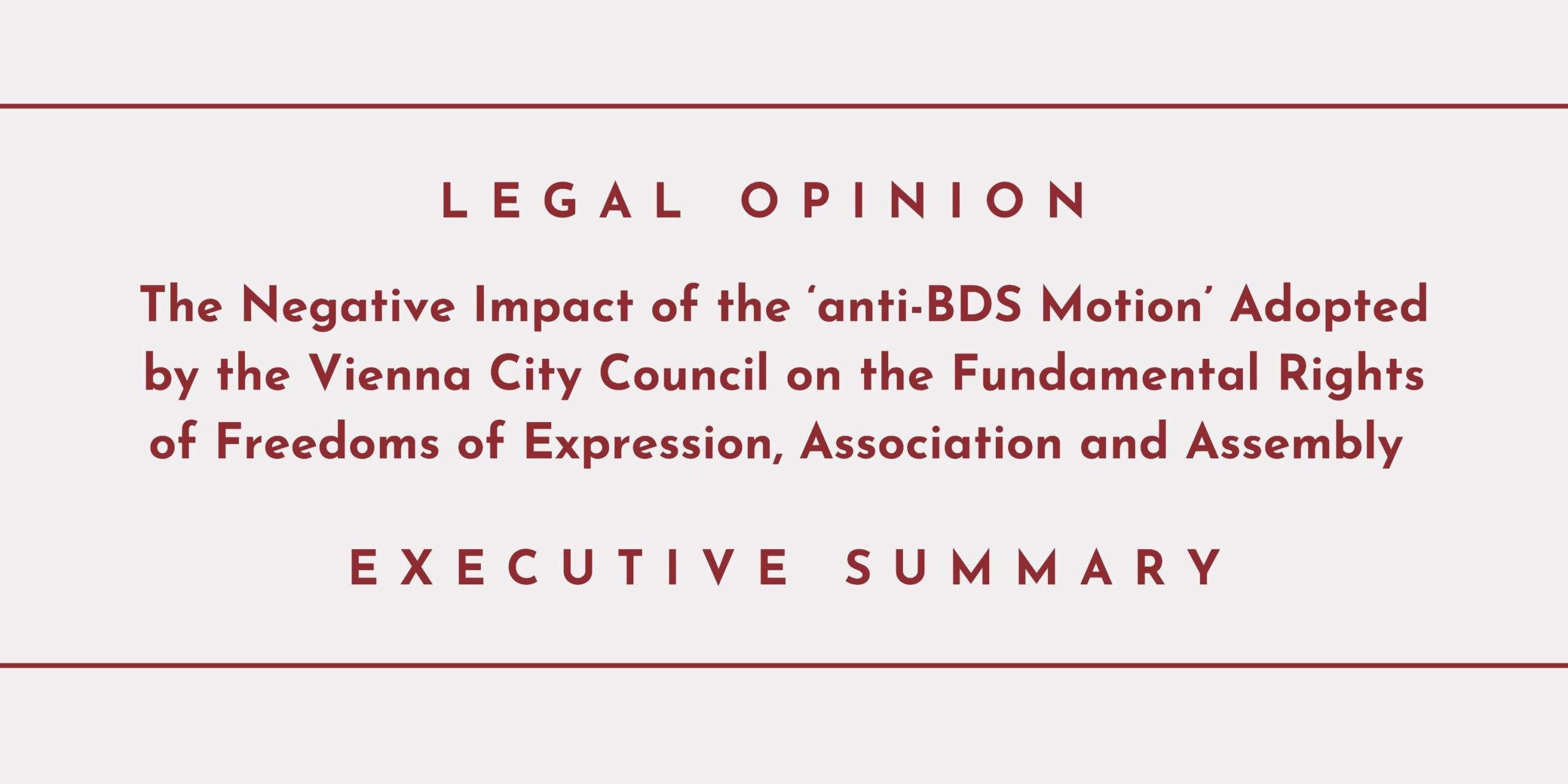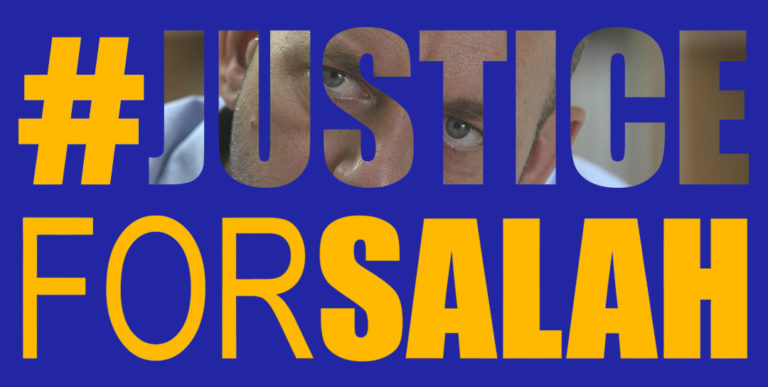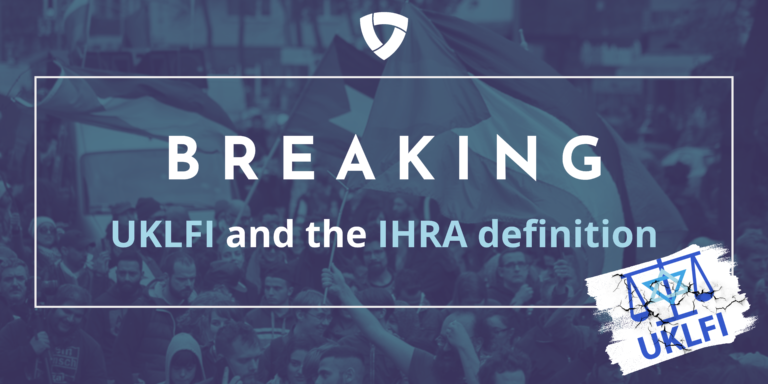The Negative Impact of the Vienna Anti-BDS Motion on the Rights of Freedoms Of Expression, Association and Assembly
This executive summary of the legal opinion published by the ELSC outlines how the ‘anti-BDS motion’ adopted by the Vienna City Council on 27 June 2018 and currently invoked in a lawsuit against BDS activist, infringes on the fundamental rights of freedoms of expression, association and assembly.
On the 29th of August 2021, BDS Austria published a social media post with a picture of the famous poster stating “Visit Apartheid” that was stuck on a billboard along with the official logo of the Municipality of Vienna. In November 2021, a member of BDS Austria was notified that the Municipality of Vienna officially filed a lawsuit against him. The Municipality, among other claims, accuses the BDS movement of “inciting hatred against Israeli people” and therefore being publicly associated with BDS would amount to defamation, since “the designation of the situation in Israel/Palestine as an ‘Apartheid’” constitutes damage to their reputation.
In response to these accusations, the Legal Opinion written by Professors Xavier Dupré De Boulois, Eric David, Richard Falk and John Reynolds establishes the legitimacy of the BDS movement and of the right to boycott by drawing on public international law, European and international human rights law.
Firstly, the Opinion illustrates that the BDS movement pursues a legitimate human rights agenda grounded in public international law, since:
I. Israel’s violations of peremptory norms of public international law are factually established. International bodies have consistently reported Israel’s non-compliance with, inter alia, the Palestinian people’s right to self-determination and Article 49 of the Fourth Geneva Convention on the unlawful transfer of civilian population. The UN Committee on the Elimination of Racial Discrimination and leading human rights organisations have also substantially documented that the State of Israel commits the crime of apartheid.
II. Against this backdrop, the international community of State and non-State actors has a responsibility to take action:
A. States have a twofold duty to:
- refrain from recognising as lawful a situation created by a serious breach of a peremptory norm of international law, and to
- refrain from providing aid or assistance in maintaining the situation created by such a breach.
B. The European Union and its Member States must respect and promote public international law, especially as regards the jus cogens right to self-determination of the Palestinian people and its ramifications.
C. Corporations must ensure respect for all internationally recognised human rights, as sanctioned by the 2011 UN Guiding Principles on Business and Human Rights.
III. Accordingly, the BDS movement pursues a legitimate aim by urging States and non-State entities to comply with their public international law obligations. Moreover, BDS is rooted in anti-racist principles, and it endorses non-violent measures to achieve its goals. It enjoys a broadly recognised legitimacy by UN Special Rapporteurs, international experts and scholars, civil society organisations, and officials of State and public institutions.
Secondly, the Opinion analyses the legitimacy of the BDS movement’s right to call for boycott from the perspective of international human rights law and ECHR law.
I. International human rights law affirms the BDS movement’s right to call for boycott
Articles 19, 21 and 22 of the International Covenant on Civil and Political Rights respectively guarantee the rights to freedom of expression, freedom of assembly and freedom of association. The right to promote, discuss and participate in boycott campaigns to raise awareness and advocate for the respect of human rights, is subsumed within these rights.
Under international human rights law, boycotting goods or institutions belonging to or coming from a given State does not constitute discrimination if it pursues a legitimate aim. In fact, BDS has the following goals:
- Affecting the foreign commercial policy of the State of Israel, which commits grave violations of international law, and pressuring that State to cease such violations;
- Targeting specifically those products that originate in illegal Israeli settlements in the occupied Palestinian territory and those institutions, companies and individuals that are involved or complicit with the State of Israel’s grave violations of international law;
- Inciting, rather than constraining, consumers to freely choose the products that they buy.
Therefore, the goal of the BDS call for boycott is not to advocate for an arbitrary discrimination of Israeli citizens, but to target a deliberate State policy and to promote compliance with public international law. The differential treatment afforded to the State of Israel by the BDS movement is solely directed at its policies and practices, not at the Jewish people.
II. The law of the Council of Europe affirms the BDS movement’s right to call for boycott
Articles 10 and 11 of the European Convention on Human Rights protect the rights to freedom of expression, of association and of assembly. In particular, freedom to impart information and ideas, as a subset of freedom of expression, allows political debate and criticism of the government, which are crucial indicators of a free and democratic society.
The BDS movement is therefore entitled to criticise Israeli government policies and to inform the public about Israel’s violations of public international law, including through a call for boycott. In the recent case of Baldassi and Others v. France, the European Court of Human Rights affirmed that “boycott is above all a means of expressing an opinion of protest. The call for a boycott […] therefore falls within the scope of […] Article 10 of the Convention”. It further stated: “incitement to differential treatment does not necessarily amount to incitement to discriminate”.
In conclusion, any action taken to silence the BDS movement or to obstruct its call for boycott represents an arbitrary and unlawful interference with the rights to freedom of expression, of association and of assembly, protected under European and international human rights law. The Vienna City Council’s anti-BDS motion as well the SLAPP initiated by the Municipality of Vienna both illustrate a few of the techniques used to curtail fundamental rights.







